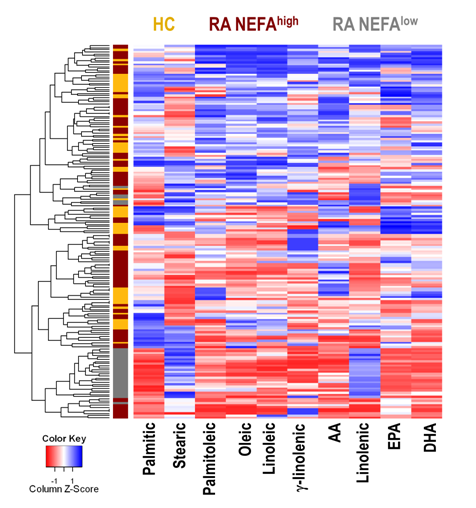Session Information
Date: Monday, November 14, 2016
Title: Cytokines, Mediators, Cell-Cell Adhesion, Cell Trafficking and Angiogenesis - Poster I
Session Type: ACR Poster Session B
Session Time: 9:00AM-11:00AM
Background/Purpose: Non-Esterified Fatty Acids (NEFA) are important lipid mediators which can play a role in a number of biological functions other than energy supply. NEFA are known to regulate gene expression in monocytes and macrophages, as well as to modulate of CD4+ T-cell function. Thus, we hypothesized that altered NEFA levels may underlie rheumatoid arthritis (RA) pathogenesis.
Methods: NEFA serum levels (palmitic, stearic, palmitoleic, oleic, linoleic, g-linoleic, arachidonic –AA–, linolenic, eicosapentaenoic –EPA– and docosahexaenoic –DHA–) were quantified by LC-MS/MS after methyl-tert–butylether (MTBE)-extraction in 124 RA patients (all fulfilling 2010 ACR/EULAR RA criteria, 61.2% RF+, 59.6% ACPA+) and 56 healthy controls (HC). Moreover, 13 prospectively-followed RA patients undergoing TNFa-blockade were recruited. CD4+ T-cell phenotype was studied by flow cytometry. TNFa, IL-8, VEGF, GM-CSF, IFNg, IL-17, MCP-1, IP-10, leptin and resistin serum levels were quantified by immunoassays. The effect of NEFA on IFNg production by PBMC was evaluated in vitro.
Results: Lower levels of palmitic (p<0.0001), palmitoleic (p=0.002), oleic (p=0.010), arachidonic (p=0.027), EPA (p<0.0001) and DHA (p<0.0001) were found in RA, some NEFA being altered at onset. No differences in total NEFA level were observed (p=0.157), thus pointing to an altered NEFA profile in RA. Cluster analysis identified a FFA profile (NEFAlow) characterized by increased stearic and decreased EPA and DHA levels to be overrepresented in RA patients compared to HC (p=0.002) (Figure 1). NEFAlow profile was associated with clinical features (RF, shared epitope and erosions), increased IFNg expression in CD4+ T-cells (p=0.002) and a Th1-enhanced serum milieu (IFNg, MCP-1 and IP-10, all p<0.005). In vitro assays demonstrated that imbalanced NEFA could underlie IFNg production by CD4+ T-cells. Finally, changes on NEFA levels were associated with clinical response upon TNFa-blockade, decreasing EPA and DHA being related to a poor clinical outcome.
Conclusion: An altered NEFA profile can be found in RA patients associated with clinical characteristics of aggressive disease and Th1-enhanced response. Impaired NEFA levels may underlie a poor clinical outcome upon TNFa-blockade. A complex NEFA profile was observed, specific NEFA being altered independently of their chemical properties. These results support the relevance of lipidomic studies in RA and provide a rationale for new therapeutic targets.
To cite this abstract in AMA style:
Rodríguez-Carrio J, Alperi-López M, López P, Ballina-García FJ, Suárez A. Non-Esterified Fatty Acids Are Associated with Clinical Features and an Enhanced Th1 Response in Rheumatoid Arthritis: Towards Disease Profiling [abstract]. Arthritis Rheumatol. 2016; 68 (suppl 10). https://acrabstracts.org/abstract/non-esterified-fatty-acids-are-associated-with-clinical-features-and-an-enhanced-th1-response-in-rheumatoid-arthritis-towards-disease-profiling/. Accessed .« Back to 2016 ACR/ARHP Annual Meeting
ACR Meeting Abstracts - https://acrabstracts.org/abstract/non-esterified-fatty-acids-are-associated-with-clinical-features-and-an-enhanced-th1-response-in-rheumatoid-arthritis-towards-disease-profiling/

